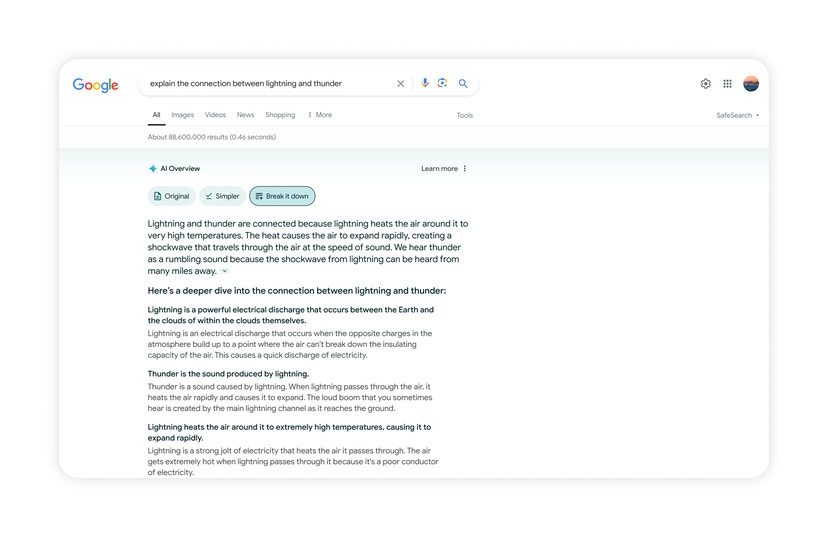A year ago, Google expressed its belief that artificial intelligence would play a crucial role in the future of search. That future is unfolding now, as the company begins to introduce “AI Overviews,” previously referred to as the Search Generative Experience (SGE), to users in the U.S. and soon worldwide. In the near future, billions of Google users will encounter AI-generated summaries at the top of many search results, marking a significant shift in how search functions.
According to Liz Reid, Google’s newly appointed head of Search, the incorporation of generative AI allows Google to streamline the search process. “With generative AI, Google can handle more of the searching for you,” she explains. This advancement means that users can focus on the aspects they find engaging or on the tasks they need to complete, as AI takes care of the more labor-intensive elements of searching.
The AI Overviews will utilize a specialized model called Gemini to summarize online content and present answers. This model will also help design and populate search results pages, creating a more integrated experience.
However, not every search will benefit from AI Overviews, Reid clarifies. For straightforward tasks, such as navigating directly to a website, like searching for Walmart to access walmart.com, the addition of AI is unnecessary. Reid believes that Gemini will be most beneficial in more complex search scenarios, particularly when users face challenges finding specific information or would otherwise refrain from using Google altogether.
One of Reid’s favorite examples is local search. She points out that navigating through numerous similar listings and reviews can be cumbersome. With Gemini, she states, “We can find the best yoga or pilates studio in Boston that is rated over four stars and is within a half-hour walk from Beacon Hill.” Furthermore, users can request specific details, such as which studio offers the best deals for first-time visitors. This feature enables the combination of information from the Knowledge Graph and the web, allowing for a more comprehensive search experience.
Reid emphasizes the importance of integrating the Knowledge Graph—Google’s traditional search tool—with AI capabilities. While certain aspects of search, like sports scores, are well established, the goal of Gemini is to ensure that users receive accurate data regardless of how they phrase their queries. “We want to expand the types of questions that will trigger accurate sports scores,” she notes, while still ensuring access to canonical data.

Acquiring accurate data is paramount for Google and other search engines. Reid explains that a significant motivation for developing the new Gemini model was to enhance the accuracy of search results. “There’s a balance between creativity and factuality with any language model,” she says. Google is committed to prioritizing factuality in its AI Overviews, which may lack charm but aim for higher accuracy. However, Reid acknowledges that no model is infallible, and Google will likely encounter challenges related to inaccuracies and misleading information.
As AI transforms the search landscape, other products, such as Perplexity and Arc, have come under scrutiny for their methods of summarizing web content without directing users to the original sources. Reid acknowledges the need for a careful balance in this regard. One approach Google is taking to ensure integrity is by not triggering overviews for certain queries. Nevertheless, she is optimistic that this new search method will encourage more clicks to the open web. While it may diminish low-value content, Reid argues that websites providing valuable perspectives, insights, or expertise will still attract users. She notes that younger audiences, in particular, seek human perspectives in their searches, and Google’s responsibility is to deliver that.

For much of the past decade, Google has aimed to transform the search experience. Originally a simple keyword search box, the platform now aspires to be an all-knowing entity capable of answering inquiries in the most helpful way possible. Reid explains, “You increase the richness and allow people to ask questions naturally.” This approach not only encourages more users to engage with the platform but also enhances Google’s revenue potential. For users, this evolution signifies a potentially revolutionary way to interact with the internet, leading to fewer clicks, less typing, and a more conversational engagement with the search engine.
With AI Overviews, Google is set to redefine the search experience, making it more intuitive and user-friendly while maintaining a commitment to providing accurate and relevant information. As this feature rolls out, it will be fascinating to see how it reshapes user behavior and the overall landscape of online searching.
